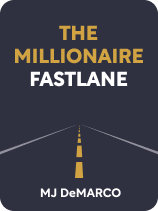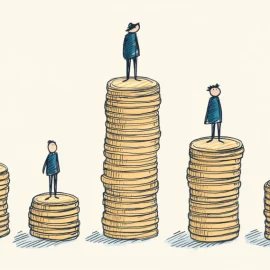

This article is an excerpt from the Shortform book guide to "The Millionaire Fastlane" by MJ DeMarco. Shortform has the world's best summaries and analyses of books you should be reading.
Like this article? Sign up for a free trial here .
What is The Millionaire Fastlane by MJ DeMarco about? Which formula is the best to achieve financial freedom and wealth?
In The Millionaire Fastlane, MJ DeMarco goes over the three common approaches to finances: consumption, accumulation, and production. DeMarco discusses each approach in detail and explains which approach is the best if you want to build wealth.
Continue reading for an overview of the three formulas from The Millionaire Fastlane.
Book Overview
In The Millionaire Fastlane by MJ DeMarco, a multimillionaire entrepreneur and investor, he challenges conventional wisdom about how to create wealth and offers a simple formula to shortcut your path to riches and early retirement. As we’ll explore in this guide, according to DeMarco, all financial strategies follow one of three formulas, each representing a distinct attitude and approach that determines both the amount of money you can accumulate and the speed at which you can achieve your financial goal. Each formula also reflects the control you have over your finances and how you use your time to make money:
- Formula #1: Insatiable Consumption: Spending more than you earn creates debt and a lifetime of poverty. You lack control over your finances and must spend your time paying debts.
- Formula #2: Hopeful Accumulation: Relying on a job and market investments restricts your income and doesn’t guarantee a wealthy retirement. You can’t control how much you earn as you rely on a set salary or wage, and you must spend time working until retirement.
- Formula #3: Active Production: Leveraging time to create passive income creates unrestricted wealth and freedom. You spend just a short amount of time creating an ongoing income stream that you have full control over.
DeMarco argues that each formula influences how you manage the various factors that impact your ability to create and enjoy wealth: your income, your spending habits and debts, the strategy you use to increase your earnings and savings, and your willingness to improve your chances of success.
In this guide, we’ll clarify DeMarco’s ideas as we delve into each of his three formulas. For the first two formulas—both common but largely unsuccessful—we’ll explain why common shortcuts to wealth don’t guarantee financial freedom. For the successful third formula, we’ll reveal how to leverage your time to generate unlimited passive income. We’ll conclude with actionable advice to help align your financial strategy with Formula #3 and fast-track your path to wealth.
| How Conditioning Impacts the Formula You Choose DeMarco argues that your finances are the result of the specific formula that you follow; how you spend your time and control your income; and the ripple effect all of this has on factors like your spending habits and motivation to earn. But why do you follow the formula that you do and behave in certain ways regarding money? According to T. Harv Eker (Secrets of the Millionaire Mind), it’s because of how you were conditioned as a child. He explains that everything you heard and experienced regarding money conditioned you to think, feel, and behave in specific ways when managing your finances—either moving you toward financial success or away from it. Eker suggests that you can overcome your conditioning to improve your finances by consciously replacing your unproductive thoughts and beliefs about money with the productive thoughts and beliefs that rich people have. |
Formula #1: Insatiable Consumption
DeMarco defines the Insatiable Consumption formula for wealth as: job + debt = a lifetime of poverty. He argues that insatiable consumers are more motivated by the illusion of wealth than actual wealth. According to him, they spend more than they earn on luxury items and experiences because they feel like they deserve the best without having to work for it. They also crave the pride, admiration, and respect that rich people enjoy, and they believe that they can achieve the same positive feelings simply by looking rich.
Seeking Short-Term Gratification Risks Long-Term Security
DeMarco explains that this attitude disregards the effort and persistence required to create wealth in favor of the quick fix of using credit to impersonate wealth. While credit (loans and repayment plans) allows you to spend far more than you earn, it destroys your chances of creating actual wealth and freedom. It forces you to work long hours and commit all future income towards debt repayment. This limits your ability to funnel money toward your financial security (pension and savings accounts), forcing you to live paycheck to paycheck. This lifestyle creates financial stress that negatively impacts your health, relationships, and your sense of freedom.
Further, DeMarco warns that when you don’t have money to spare, you lack control over your finances because you’re at the mercy of external factors: job losses, economic recessions, credit interest hikes, and mortgage inflations. Any one of these factors can destroy your credit rating, further negate your net worth, and bankrupt you.
Financial Outcome: Poverty
DeMarco argues that if you buy things you can’t afford without considering the impact this has on your financial security and lifestyle, you’ll never accumulate wealth. This applies even if you earn a high salary—spending more than you earn always leads to poverty.
Formula #2: Hopeful Accumulation
DeMarco defines the Hopeful Accumulation formula for wealth as: job + market investments = restricted income and a mediocre retirement. According to him, hopeful accumulators follow popular methods touted by financial advisors as a guaranteed path to a comfortable retirement: Get an expensive education, work hard for 40 to 50 years, sacrifice pleasures, budget every cent, buy a house, and funnel all surplus money toward pensions, safe investments, and savings accounts.
Sacrificing Time and Money Creates the Illusion of Control
DeMarco argues that this formula severely limits your chances of creating wealth because it’s entirely dependent on a number of factors that you can’t control: the value of your education, the time you spend working, the economy, interest rates, and your health and well being.
Financial Outcome: You Might Get Rich but You Won’t Be Able to Enjoy It
DeMarco argues that committing to lifetime employment, delaying gratification, and waiting decades for compound interest to accumulate won’t guarantee a wealthy retirement—the plan relies on numerous factors that are out of your control. Further, he asserts that sacrificing your time, freedom, and pleasures isn’t worth the effort since you’ll be too old to enjoy your wealth, and inflation will reduce the value of any money you do manage to accumulate.
Formula #3: Active Production
DeMarco defines the Active Production formula for wealth as: unrestricted profits + investments and assets = massive wealth and early retirement. He argues that active producers are motivated by the goal to create and enjoy wealth. However, unlike insatiable consumers, they don’t confuse “get rich quick” with “get rich easy.” DeMarco explains that they’re willing to practice discipline and forfeit short-term comfort while they work on maximizing their income and net worth. As a result, they achieve extraordinary wealth in a short period of time and can buy what they want without fear of incurring debts.
Leveraging Time Creates Passive Income and Freedom
According to DeMarco, the key reason active producers get rich fast is that they leverage their time—this means they use their time to create passive income, or something that generates recurrent income without their direct involvement. Leveraging your time removes your need to work for an income and dramatically improves your chances of creating wealth.
DeMarco argues that you can’t leverage your time at a conventional job because your income directly relies on how many hours you work or how much you produce.
On the other hand, investing time in work that generates passive income—by creating a product or system that’s capable of earning an income long after your original time investment—expands your income potential.
Consequently, DeMarco insists that investing your time and money in assets that appreciate over time—such as physical or intellectual property that you can lease or sell—is the fastest way to grow your net worth and earn millions.
Financial Outcome: A Lifetime of Luxury and Freedom
DeMarco argues that allocating money toward businesses and investments that provide passive income explodes your earnings and positively impacts the things that matter: your health, relationships, and sense of freedom. While this formula does initially require a heavy investment of time, effort, and persistence to come up with viable opportunities for passive income, the rewards are far greater than anything you could hope to receive from the other two formulas.

———End of Preview———
Like what you just read? Read the rest of the world's best book summary and analysis of MJ DeMarco's "The Millionaire Fastlane" at Shortform .
Here's what you'll find in our full The Millionaire Fastlane summary :
- The three formulas that all conventional financial strategies follow
- Why these formulas represent shortcuts that don’t guarantee financial freedom
- How to generate a massive income in a short time






